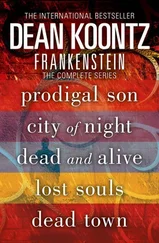Using the brochure as an ice-breaker, Junior circulated through the throng, seeking anyone who'd attended the Academy of Art College and might have met Celestina White. The critiques of her paintings were uniformly negative, frequently hilarious, but never as succinct and violent as Sklent's.
Eventually, a braless blonde in shiny white plastic boots, a white miniskirt, and a hot-pink T-shirt featuring the silk-screened face of Albert Einstein, said, “Sure, I know her. Had some classes with her. She's nice enough, but she's kind of nerdy, especially for an Afro-American. I mean, they're never nerdy—am I right?"
“You're right, except maybe for Buckwheat."
“Who?” she shouted, though they were perched side by side on a black-leather love seat.
Junior raised his voice even further: “In those old movies, the Little Rascals."
“Me, I don't like anything old. This White chick's got a weird thing for old people, old buildings, old stuff in general. Like she doesn't realize she's young. You want to grab her, shake her, and say, 'Hey, let's move on,' you know?"
“The past is past."
“It's what?” she shouted.
“Past!"
“So true."
“But my late wife used to like those Little Rascals movies."
“You're married?"
“She died."
“So young?"
“Cancer,” he said, because that was more tragic and far less suspicious than a fall from a fire tower.
In commiseration, she put a hand on his thigh.
“It's been a tough few years,” he said. “Losing her ... and then getting out of Nam alive."
The blonde's eyes widened. “You were over there?"
He found it difficult to make a painful personal revelation sound sincere when delivered in a shout, but he managed well enough to bring a shine of tears to her eyes: “Part of my left foot was shot off in this upcountry sweep we did."
“Oh, bummer. That sucks. Man, I hate this war."
The blonde was coming on to him, just as a score of other women had done since his arrival, so Junior tried to balance seduction with information gathering. Putting his hand over the hand with which she was gently massaging his thigh, he said, “I knew her brother in Nam. Then I got wounded, shipped out, lost touch. Like to find him."
Bewildered, the blonde said, “Whose brother?"
“Celestina White's."
“She have a brother?"
“Great guy. Do you have an address for her, a way maybe I could get in touch about her brother?"
“I didn't know her well. She didn't hang out or party much—especially after the baby."
“so she's married,” Junior said, figuring that maybe Celestina wasn't his heart mate, after all.
“Could be. I haven't seen her in a while."
“No, I mean, you said 'baby.“'
“Oh. No, her sister. But then the sister died."
“Yeah, I know. But-"
“So Celestina took it."
“It?"
“The kid-thing, the baby."
Junior forgot all about seduction. “And she—what?—She adopted her sister's baby?"
“Weird, huh?"
“Little boy named Bartholomew?” he asked.
“I never saw it."
“But his name was Bartholomew?"
“For all I know, it was Piss-ant."
“What?"
“I'm saying, for all I know.” She took her hand off his thigh. “What's all this about Celestina, anyway?"
“Excuse me,” Junior said.
He left the party and stood in the street for a while, taking slow deep breaths, letting the brisk night air clean the pot smoke out of his lungs, slow deep breaths, suddenly sober in spite of the beer he'd drunk, slow deep breaths, as chilled as a slab of beef in a meat locker, but not because of the cold night.
He was astonished that adoption records would be sealed and so closely guarded when a child was being placed with a member of its immediate family, with its mother's sister.
Only two explanations occurred to him. First, bureaucracies slavishly follow the rules even when the rules make no sense. Second, the Ugliest Private Detective in the World, Nolly Wulfstan, was an incompetent dunce.
Junior didn't care which explanation was correct. Only one thing mattered: The Bartholomew hunt was at last nearing an end. On Wednesday, December 27, Junior met Google, the document forger, in a theater, during a matinee of Bonnie and Clyde.
As instructed earlier by phone, Junior purchased a large box of Raisinettes and a box of Milk Duds at the refreshment stand, and then he sat in one of the last three rows in the center section, eating the Milk Duds, grimacing at the sticky noises his shoes made when he moved them on the tacky floor, and waiting for Google to find him.
Packed full of aftermath, the movie was too violent for Junior's taste. He had wanted to meet at a showing of Doctor Dolittle or The Graduate. But Google, as paranoid as a lab rat after half a lifetime of electroshock experiments, insisted on choosing the theater.
Although he related well to the theme of moral relativism and personal autonomy in a value-neutral world, Junior grew apprehensive about each impending scene of violence, and closed his eyes against the prospect of blood. He resented having to endure ninety minutes of the film before Google finally settled into the seat beside him.
The forger's crossed eyes glowed with reflected light from the screen. He licked his rubbery lips, and his prominent Adam's apple bobbled: “Like to drain my pipes in that Faye Dunaway, huh?"
Junior regarded him with undisguised repulsion.
Google didn't realize that he was an object of disgust. He wiggled his eyebrows in what he evidently assumed to be an expression of male camaraderie, and he nudged Junior with one elbow.
Only a few theater goers attended the matinee. No one sat near, so Google and Junior openly swapped packages: a five-by-six manila envelope to Google, a nine-by-twelve to Junior.
The papermaker withdrew a thick wad of hundred-dollar bills from his envelope and, squinting, inspected the currency in the flickering light. “I'm leaving now, but you wait until movie's over."
“Why don't I go, and you wait?"
'Cause if you try that, I'll ram a shiv through your eye."
“It was just a question,” said Junior.
“And, listen, if you leave too soon behind me, I've got a guy watching, and he'll put a hollow-point thirty-eight in your ass."
“It's just that I hate this movie."
“You're nuts. It's classic. Hey, you eat those Raisinets?"
“Told you on the phone, I don't like 'em."
“Gimme."
Junior gave the Raisinets to him, and Google left the theater with his candy and his cash.
The slow-motion death ballet, in which Bonnie and Clyde were riddled with bullets, was the worst moment Junior had ever heard in a film. He didn't see more than a brief glimpse of it, because he sat with his eyes squeezed shut. Nine days previously, at Google's instructions, Junior had rented boxes at two mail-receiving services, using the name John Pinchbeck at one, Richard Gammoner at the other, and then he had supplied those addresses to the papermaker. These were the two identities for which Google ultimately provided elaborate and convincing documentation.
On Thursday, December 28, employing forged driver's licenses and social-security cards as identification, Junior opened small savings accounts and also rented safe-deposit boxes for Pinchbeck and Gammoner at different banks with which he'd never previously done business, using the mailing addresses that he'd established earlier.
In each savings account, he deposited five hundred dollars in cash. He tucked twenty thousand in crisp new bills into each safe-deposit box.
For Gammoner, exactly as for Pinchbeck, Google had provided: a driver's license that was actually registered with the California Department of Motor Vehicles, and that would, therefore, stand up to any cop's inspection; a legitimate social-security card; a birth certificate actually on file with the cited courthouse; and an authentic, valid passport.
Читать дальше











